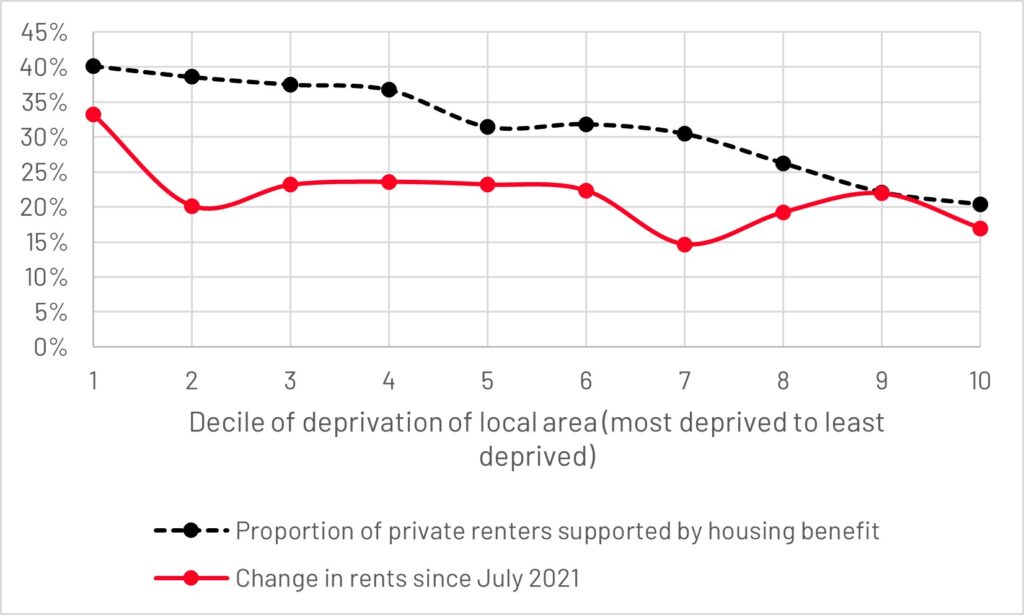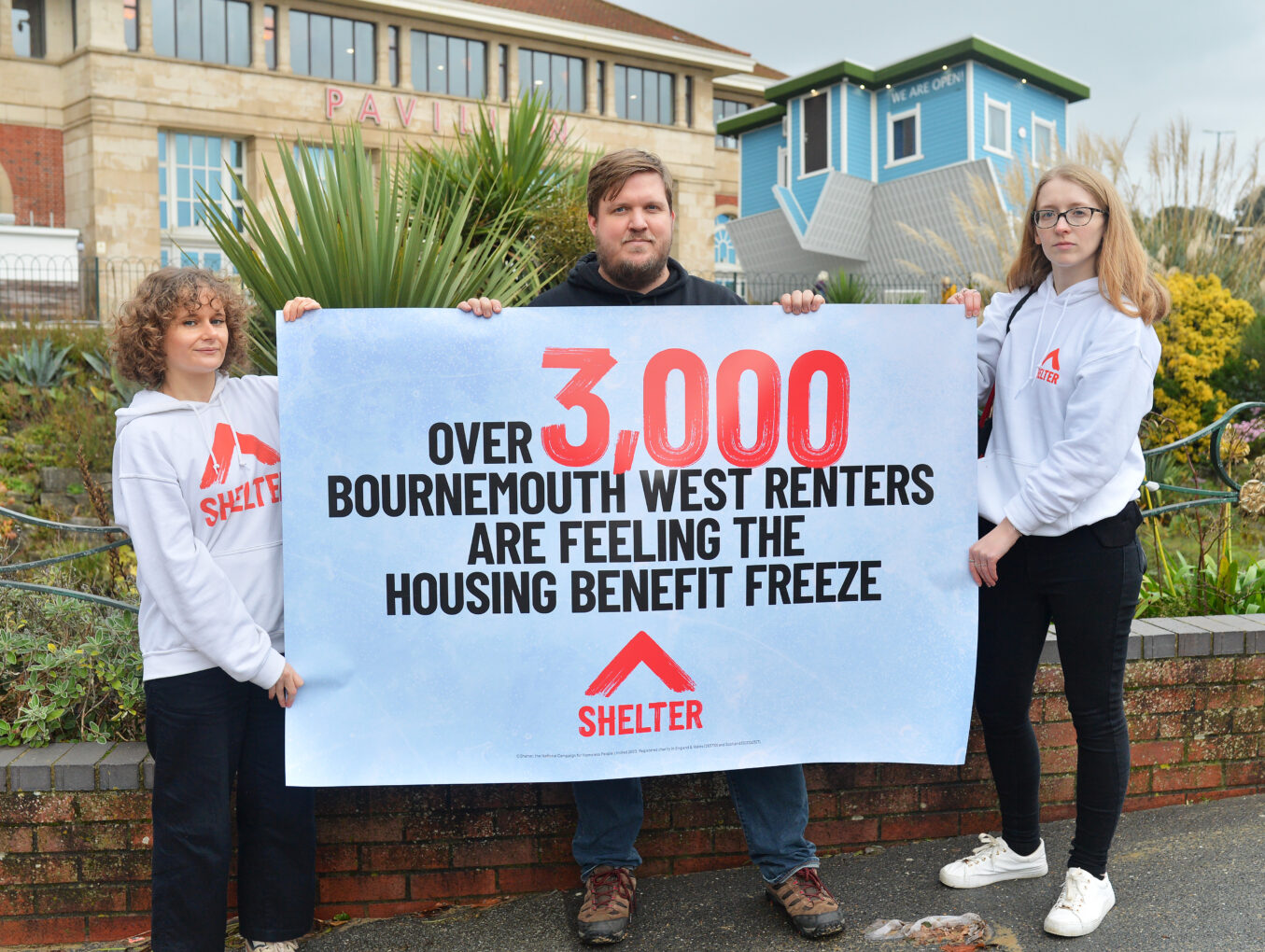At next week’s Autumn Statement, Chancellor Jeremy Hunt faces a big decision which could tackle record homelessness and protect thousands of renters on the edge this winter. Will he unfreeze housing benefit?
The local housing allowance (LHA) determines the amount of housing benefit that private renters can receive. It’s supposed to cover the cheapest 30% of local private rented homes. But LHA has been frozen for more than three years while rents have soared, meaning that just 5% of advertised rents are now affordable.
The result? Struggling private renters are pushed into homelessness because, if they’re evicted or have to move, there are hardly any affordable options available to them. Consequently, homelessness is now at a record high of over 100,000 households and rising.
There are loud voices calling on Jeremy Hunt to end the freeze, from campaigners like the Cover the Cost coalition to local authorities led by all parties. And now even his cabinet colleagues Michael Gove (Secretary of State for Levelling Up, Housing and Communities) and Mel Stride (Secretary of State for Work and Pensions) have joined the calls. They’ve written a letter to the chancellor and are pressing him to end the freeze of housing benefit.
Ahead of the Autumn Statement, there’s talk of needing to tighten budgets or even make cuts to balance the books. But the LHA freeze is a false economy and harms the government’s attempts to grow the economy by getting people into work.
Cutting housing benefit isn’t bringing rents down
Sometimes people (including politicians) say that unfreezing LHA could have the unintended consequence of causing rents to increase. However, analysis by the Department for Work and Pensions has shown that there’s no clear link between LHA rates and rent increases.
Academic researchers studying the austerity reforms to housing benefit found that income, or lack of it, is not the main factor driving demand for housing. So, reducing the level of rent that LHA will cover doesn’t create pressure on landlords to reduce rents.
If the local housing allowance had a significant impact on rents, we’d expect the freeze to have held down rents in the areas with the most housing benefit claimants. But data on agreed rents for new lets from estate agency Hamptons suggests the opposite. It’s actually more deprived areas (with a higher proportion of private renters in receipt of housing benefit) that have seen rents increase the most during the period that LHA has been frozen. Since July 2021, rents achieved for new lettings in the most deprived areas where two in five (40%) of renters rely on LHA have risen by 33%. Meanwhile, in the least deprived areas they have risen by just 17%.

With rents soaring, it’s struggling renters who are disproportionately experiencing the steepest increases. Restoring the local housing allowance wouldn’t raise rents, but it would give private renters a much better chance of coping with the steep rent hikes they’re facing.
Cost of living support isn’t stopping homelessness
The line from ministers, when questioned on the freeze, is that they invested in local housing allowance in 2020 (the last time they restored LHA to cover the cheapest 30% of rents) and have ‘maintained’ the rates ‘in cash terms’ since then. But the record rent increases in this period mean LHA has effectively faced a large real-terms cut, as it covers a smaller and smaller proportion of housing costs.
Ministers also point to emergency support like discretionary housing payments (DHPs). These payments are administered by councils as alternative sources of help for people at risk of homelessness. But the DHP fund was cut in 2022 and has been frozen since then. According to this PoliticsHome article, councils are being forced to overspend their budgets and turn away DHP applicants.
And the household support fund, another pot of emergency cash administered by local authorities, doesn’t prevent homelessness. It’s intended to help people struggling to afford all kinds of essentials, including bills and food. As a result, government data shows that only 86 of 152 councils reported spending any of this support on housing costs from October 2022 to March 2023, and most spent 5% or less of their overall household support fund budget on housing costs.
Crisis support is valuable for helping with one-off costs and short-term problems, but it’s no substitute for adequate housing benefit. One-off payments are not the answer to record homelessness.
Renters can’t afford the freeze
Instead, the cost of the freeze is paid by struggling renters who must use meagre incomes to top up their housing benefit. They have to cut spending on the rising cost of other essentials like food and heating, just to keep a roof over their heads. 930,000 renters face average monthly shortfalls of £163, a huge amount to make up.
And those forced into homelessness contend with extortionate bills for ‘top-up’ payments on temporary accommodation (TA). There are many other hidden additional costs of homelessness, like extra transport to get to work and school if they’re accommodated out of the area, or takeaway food because they’re stuck in TA without any kitchen facilities.
Becoming homeless traps people in poverty and prevents them from working. A research report by Shelter found that one in ten adults living in temporary accommodation have had to give up work completely and more than one in four have had to reduce their hours. Although the government insists that getting people into work is a key priority, by pushing more and more people towards homelessness, the LHA freeze does the opposite.
This is all in addition to the huge mental and physical impacts of stress, as people worry about how to pay the month’s rent or don’t know where their family could be living from one week to the next.
Councils can’t afford the freeze
The costs of the freeze are also paid by the government in the form of other spending. The most obvious is the cost of temporary accommodation itself, which is stretching local authorities to breaking point.
Last year, councils spent a whopping £1.7 billion on TA, much of which was spent on expensive B&B or private nightly rate accommodation. This is more than double the estimated cost of restoring LHA to cover the 30th percentile for 2023/24 (£700 million).
With a record 104,000 homeless households now living in TA, these costs are escalating quickly and pushing council finances to the brink. In a recent letter to the chancellor, 119 councils rang the alarm bell. They urged him to take action to prevent homelessness, including by restoring LHA, to avert local authorities having to declare themselves bankrupt.
Last week, London Councils published research showing that ending the freeze would save the public finances £100 million a year in London alone. It would also prevent 60,000 Londoners from becoming homeless over the next six years.
The chancellor must seize the moment and act
The ultimate solution to unaffordable private rents is to build a new generation of social homes, but that can’t be achieved overnight. In the meantime, the government must get a grip on record homelessness. The LHA freeze means that struggling renters, people stuck in temporary accommodation and local authorities are paying the price of the government’s inaction.
You can help keep up the pressure on Jeremy Hunt by emailing your MP, asking them to tell him about the importance of ending the housing benefit freeze next week.

